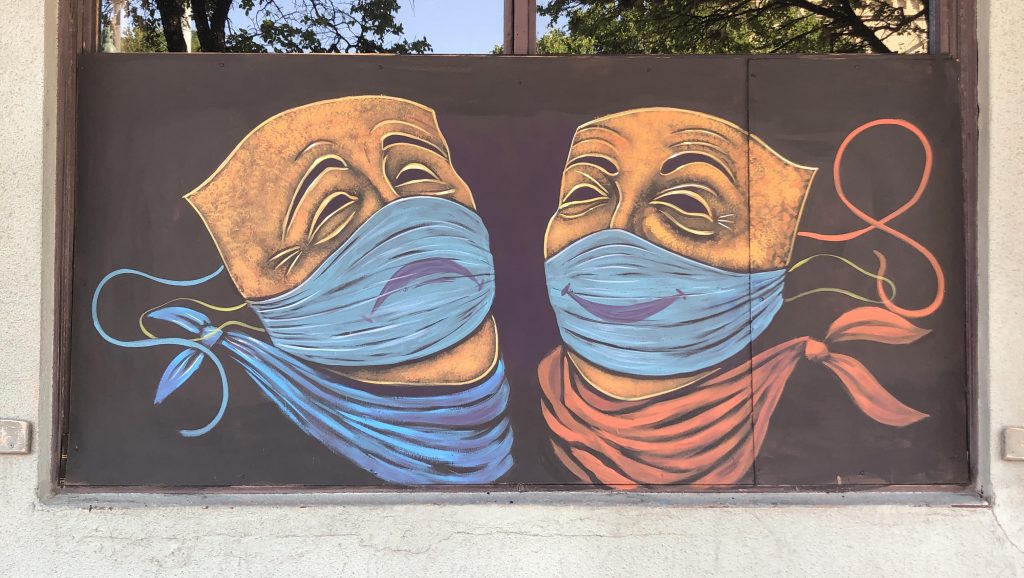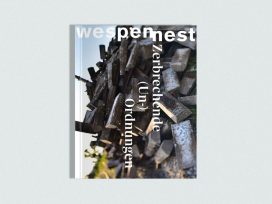The return to normality invoked ever since the start of the pandemic has yet to happen. Even with the vaccine the dangers have still not been banished, as one wave follows the next. Battles over allocation of resources have long since begun, and they do not inspire hope for a post-coronial future. Once again, the winners take it all, leaving the losers with nothing but anger and resignation. And all the while, the ideologues shout at each other across empty arenas.
The cultural sphere has been particularly badly hit. Not only have those engaged in art, criticism and research been treated shabbily (the little support they did received immediately placed them under suspicion of fraud), but the crisis has also been exploited in a culture war from above. Apparently, the ‘system’ has no use for independent, critical and vibrant culture.
A golden opportunity has arisen to get rid of a troublesome appendage – one that demands that its costs are borne by society and not the market, and with its resistant conventions and discourses obstructs the marketization of the aesthetic sphere.
A ‘conservative’ – not to say rightwing populist – war on public radio stations has broken out. The closure of cinemas, theatres and galleries is celebrated as ‘creative destruction’, while cultural institutions are left begging for recognition of their ‘systemic importance’.
The post-democratic state

This article is a translated and edited excerpt from Georg Seeßlen’s book Die zweite Welle: Corona & Kultur (‘The second wave: Corona and culture’) published by Bahoe Books (2021).
Have we used the slowdown in social and economic processes as an opportunity to reflect? To seek solutions for increasing social division, impending ecological disaster and endless territorial wars around the world? How can we prepare for the ‘next wave’ if we haven’t learnt from this one? One thing only has become apparent: that all the chances supposedly contained in a crisis have been squandered.
Awakening from its lethargy, the ‘centre of society’ might ask what has happened and what will go on happening. Have we seen new ideas for essential and radical change in our systems and relations – changes which will come, whether by design or catastrophe? Have there been at least tentative suggestions that we should not simply carry on as before? Is there even a vague notion that the pandemic will be neither the last crisis created by ‘the system’?
Are we beginning to see discussions about how power is distributed in the societies that divide up the global economy? About how a second great transformation has appropriated the last spheres of nature and humanity in order to make them compatible with a market that is less free than ever? A market that, having seized control of land and labour, now targets creativity and the psyche?
How it is that, in the middle of a pandemic, the arms industry is booming? Has there been a great catharsis giving rise to a common effort to prevent climate catastrophe? Are we mobilizing culture, criticism and knowledge to enable a future that deserves the name?
The answer to all these questions is no. That a small portion of humanity has evidently lost its mind – the Covid deniers, the tinfoil hat wearers and those who don’t mind mixing with Nazis – doesn’t mean that the rest of society has somehow come to its senses.
There are six major areas that we need be concerned with:
1. The liberation of nature, which in concrete terms means liberating the land from the ownership of those who exploit it, be it as speculative property, as supplier of raw materials, or as agro-industrial, monocultural destruction.
2. The liberation of human beings from their role as a commodity to be traded on the labour market, as ‘capital’, raw material and waste.
3. The liberation of the economy by making it democratic and ecological.
4. The liberation of the world from war.
5. The liberation of all human beings from racism, sexism, class discrimination and nationalism. The liberation of all human beings from notions of value and importance.
6. The liberation of art, culture and science from their captivity within the political economy of the very system that needs to be understood and overcome.
These goals ought to be self-evident by any standard of reason and morality. Yet, in a propaganda campaign to return to the past, the protagonists of neoliberalism have recast them as a revival of ‘socialism’ and ‘the command economy’. In the development of contemporary neoliberalism, not just everything ‘revolutionary’, but also anything mildly reformative has been demonized. The mainstream has made abundantly clear that it would rather work with the populist right and neo-fascists than compromise on the three pillars of the new capitalism: privatization, globalization and digitization.
If these three movements of capital were still thought of as a harmonic whole before the pandemic, then their inherent contradictions have since become clear. Simultaneously, the ‘old’ components of capitalization – the exploitation of territory (land and the environment), the exploitation of human labour and the endless multiplication of money, in order to enable boundless growth and competition – have reached their limits.
In the crisis, the relation between politics and economics seems to have changed once more. It might appear that the post-democratic state is again displaying its capacity for public welfare – as if to prove it were not merely a proxy for the big players in the global economy. But the neoliberal variant of the classic social-democratic model needs the state in order to generate endless profits. Creative destruction (Schumpeter) has found a new guise, and that which could not previously be globalized, digitized or privatized has been forced to yield.
Culture and the dictate of importance
But the aim is not only economic cleansing through the destruction of institutions (and the people in them) unable to survive without collective social effort (through ‘subsidy’). The aim is also clearly the cleansing of discourse and culture. Critical journalism, subversive art, unmarketable scholarship and everything less ‘systemically important’ are to be purged. Just as, in the global financial crisis, the very forces that had caused the disaster emerged from it strengthened and empowered, so the beneficiaries of the Covid crisis are those that have shown themselves the least social and ‘civilized’.
The question now arises as to how people and institutions in the sectors of culture, art, academia, criticism and media should conduct themselves during the crisis and after (if it ever comes to that). For individuals, institutions and entire branches, this is primarily a question of sheer survival. Hardly anyone can afford to reject support when it is offered, even if the conditions soon become clear. Whoever wishes to be rescued must express their willingness to submit to the dictates of ‘systemic significance’. One becomes blackmailable and controllable. Even this is no guarantee that one will not become an object of ‘creative destruction’ by a cultural and financial bureaucracy ready to go to any lengths in support of the radical ‘free marketeers’.
The post-democratic state has declared itself willing to save ‘the’ cultural sector, ‘the’ creative workers and, ultimately, ‘the’ cultural and creative economy. But this is more propaganda than reality: there is no talk of saving their freedom and autonomy. In the crisis, culture is being redefined as the production of aesthetic and discursive goods to be bought and sold, fully adapted to the market at last.
The principle of creative destruction in relation to culture is fatal in the truest sense of the word. Even years before the crisis, a wave of poverty and uncertainty had built up; contempt for ‘losers’ had grown into general contempt for culture. The cultural loss during crisis has confirmed the trend: culture is either an ‘avant-garde’ product, as we see in the art market and the interconnection of culture, tourism and the event industry; or it is entertainment for losers and killjoys provided ‘at our expense’. Social pecking orders and ‘fine distinctions’ have always existed; but in the age of neoliberalism, punching down has become systemic.
After a few avowals of ‘solidarity’ (more embarrassing than anything), the Covid crisis has intensified this battle. On the one hand, culture’s role is seen as being to challenge the ‘system’ (systemically important art is therefore a contradiction in terms); on the other, culture itself is a means of ‘punching down’. ‘Culture’ has become synonymous with the marginal and niche, caught between neoliberal propaganda and the nationalist, anti-modern ideology of the far right.
Marginalization and backlash
From the economic point of view, culture is indeed a sector in which too much is produced, and too little consumed (or consumed in the ‘wrong’ way). In the ideal world of the neoliberals, ‘society’ should not even exist; ‘creative destruction’ ought therefore to have a cleansing effect. ‘Privatization’, digitization and globalization should no longer require the protective shield of a democratic civil society.
All this of course is in line with the interests of the post-democratic state, which seeks to divest itself of its obligation to support the arts and to reduce public spaces until globalized culture no longer interrupts ‘free trade’. Nationalized and globalized culture can be conducted in parallel, as so many populist and autocratic regimes have shown.
These are not new developments. But in the crisis, resistance from the producers of culture is weakened in the same way that public discussion about culture and society is marginalized. Just as in the job market, people who might claim social benefits or place demands on their employers are compelled to take on any kind of work imaginable (or fund a senseless further education market), now the culture sector has been successfully brought to heel. The arts are at the weakest they have been since 1945; but now, through their ‘systemic importance’, they are expected to absorb the social consequences of the crisis and be part of the strategy of ‘return to normality’.
The experience of art and culture in the crisis is, it must be said, ambiguous. On the one hand, the resistance has a new quality of experience and awareness. The risk of poverty and the precarious nature of employment are ever-present spectres; the association of art, culture and activism within democratic civil society is becoming more intense, frequently ‘with the courage born of desperation’.
But there has been a populist backlash, which has received a boost thanks to a new alliance with pressure groups from the ‘centre’, including the culture sector itself. This has changed not only the political, but also the cultural climate. A nationalist and populist potential has emerged in the cultural sphere (for example in rightwing cabaret) and antipathy towards art, culture and critical journalism has become socially acceptable. It is always the same two sectors that autocrats and populists want to cut back most mercilessly: welfare and culture. To play the two off against each other is pure propaganda.
Given the impending catastrophes that face us, a transformation of state and economy is not only desirable, but vital. But the transformation cannot be achieved without the critical, assertive and self-reliant sector known as ‘culture’. Culture serves both as a productive force and as a democratic institution of accountability. It is an authority able to shape and monitor events. What happens to the cultural sector during and after the crisis will be part of our decision about what a future society can be.
This article is a translated and edited excerpt from Georg Seeßlen’s book Die zweite Welle: Corona & Kultur (‘The second wave: Corona and culture’), published by Bahoe Books (2021).








